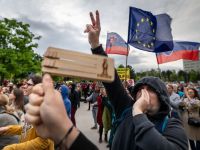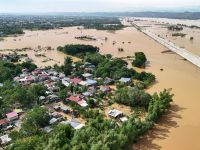Israel may have to reoccupy territories handed over to the Palestinian Authority under the Oslo accords, declared the Israeli Deputy Chief of General Staff Major General Moshe Ya'alon on Thursday, in an interview with an Israeli Intelligence Corps internal bulletin.
A potential candidate to take command of the Israeli Army, Ya'alon also said it is possible to end the Palestinian –Israeli conflict with the Palestinians "in the near future" by creating more effective deterrence measures, reported the Jerusalem Post.
"[This conflict] won't last for years," Ya'alon pointed out. "Since the War of Independence, there have not been clashes such as there are today with the Palestinians". "The conflict is complex. I don't buy this story that this is all a popular uprising that got out of control."
He made it clear that the first step to be taken is to deploy forces in order to end “terror.”
"We are operating in a variety of ways, from targeted interceptions against active activists such as [Hamas terrorist] Mahmud Abu Hanud, who planned to carry out a triple suicide attack," Ya'alon admitted. "In addition to this we are securing territory and cordoning off areas, and this is a signal to the Palestinian Authority," he added.
With regards to steps that ought to be taken, he stated, "It could be that we will have to return to the territories that we withdrew from in the Oslo accords".
Israel Radio reported this week that right-wing ministers had pressed for ousting Arafat from the Palestinian self-ruled territories.
Ya'alon also revealed that as OC Intelligence in 1995, he suspected the Palestinian Authority was becoming a danger by not cracking down on the “terrorist” infrastructure. He said he advised then Prime Minister Yitzhak Rabin that the only way to get them to breakdown on “terror” was to give them an ultimatum.
According to Ya'alon, Rabin agreed, but decided to wait until after the elections scheduled for January 1996, however, Rabin was assassinated in November 1995.
The Jerusalem Post adds that Ya'alon said the wave of suicide bombings in early 1996 was similar to the attacks of the past few months. However, Ya'alon noted, Arafat then arrested 1,200 people, and not just the 35 which Israel demanded.
"We concluded that [Arafat] saw Hamas as a rival, but also as a tool to use as an agent when needed, much like the Syrians use Hizbullah," Ya'alon conveyed.
"I said then and I say now that the chairman sees terror as a tool to use. Also, Arafat has strategic, not necessarily tactical, control of every incident. Arafat is not afraid of a civil war," he said.
He added that Arafat would change only when he felt immense pressure. "So far, he does not feel he is against this wall. He has seen the lack of readiness on the Israeli side to make him keep his obligations as a weakness," Ya'alon said.
He defended the assassination of Palestinian activists, which has drawn international criticism, "If we had not adopted this policy there would still be terrorism. Those who claim otherwise don't know the situation here. The Palestinians, led by Arafat, follow a strategy of terrorism, which is aimed at breaking us or drawing international intervention. But the world at the moment is against them, because the international community understands that the Palestinians are responsible for the situation," Ya'alon asserted.
Ya'alon said the Palestinians' goal is achieving a Palestinian state without promising to end the conflict with Israel.
"It is clear to me that if we cave in and the Palestinians achieve this goal of a state without ending the conflict, it would be a catalyst for them to continue the war against us, a catalyst for negative processes for Israeli Arabs and a catalyst for Arab states," Ya'alon said.
The deputy chief stated that the Israeli army withdrawal from Lebanon in 2000 gave the Palestinians a "fighting spirit" to launch the latest Intifada, despite the fact that he identified an intention to do so as far back as 1999. "The Palestinian leadership presumed that Israeli society would break after a few weeks of conflict," he said.
Regarding Syria and other states in the region, he said that they have made it clear they would not let the Israeli-Palestinian conflict drag the entire region into a regional war.
"Arafat is endangering the regimes in Egypt and Jordan. The lack of backing from the Arab world is a factor restraining the region from sliding into war, but there is also Hizbullah and Iran and Iraq," he said.
Also interviewed was Major General Amos Gilad, coordinator of Israeli government activities in the Palestinian territories, who said there is no need to reoccupy Palestinian cities in the West Bank. He also pointed out that Arafat posed the most serious threat to Israel, and added that Arafat would never give up the right for Palestinian refugees to return to Israel. (Albawaba.com)
© 2002 Al Bawaba (www.albawaba.com)







